Comprehensive Report on Dementia: Diagnosis, Treatment & Support
VerifiedAdded on 2023/06/15
|7
|1588
|234
Report
AI Summary
This report provides a comprehensive overview of dementia, addressing the increasing prevalence, signs, and symptoms of the condition. It compares and contrasts various diagnostic investigations, including neurological and cognitive tests, brain scans, genetic tests, and blood tests. The report examines the initial treatment and support options available for service users, such as medication, cognitive stimulation therapy, and rehabilitation. It also discusses the long-term complications associated with dementia, including pneumonia, insomnia, and malnutrition. Furthermore, the report details the treatment and support available for service users in the end stages of dementia, emphasizing comfort and proper nutrition, as well as the support available for families, such as Admiral Nurses. The information is supported by references to relevant books and journals.
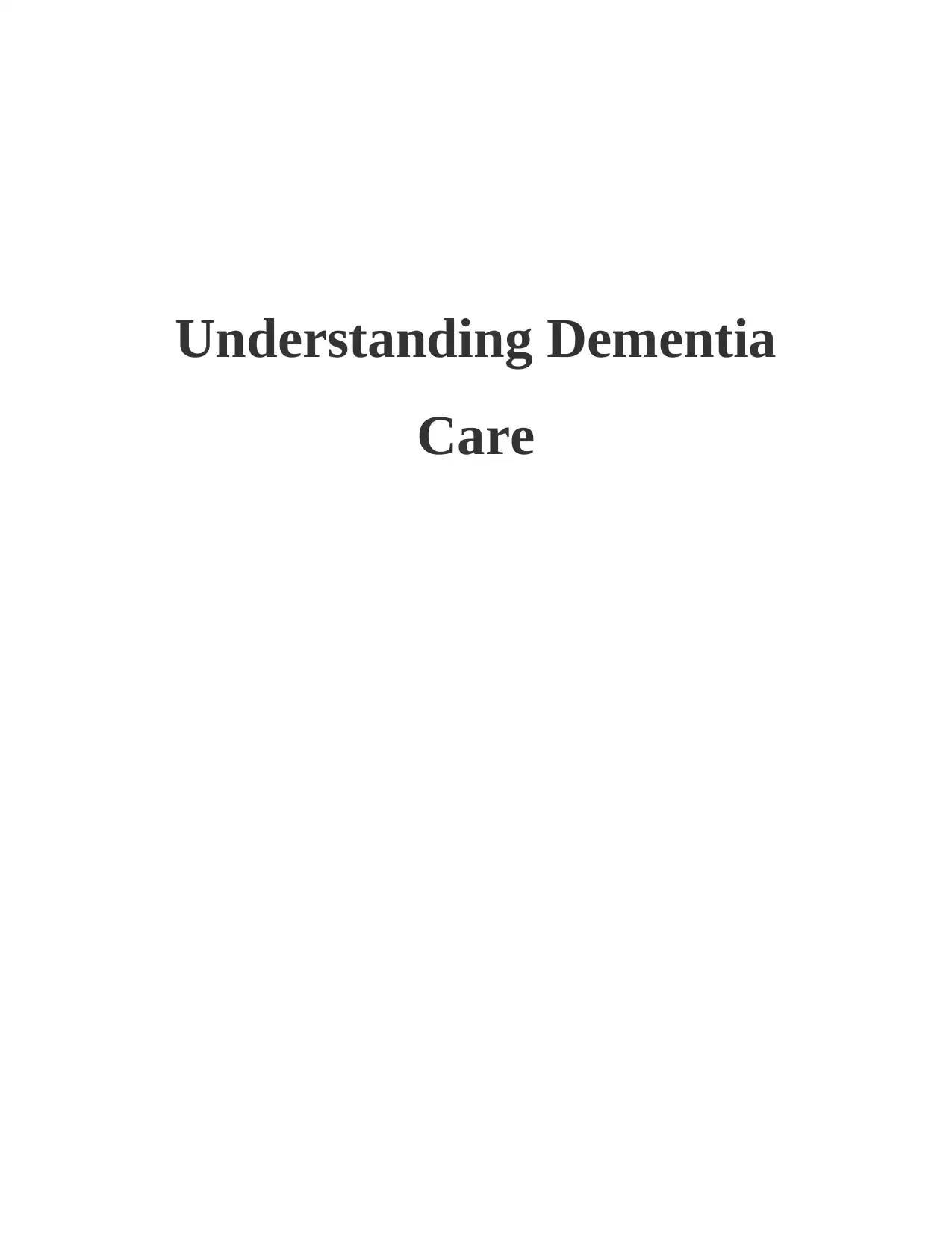
Understanding Dementia
Care
Care
Paraphrase This Document
Need a fresh take? Get an instant paraphrase of this document with our AI Paraphraser
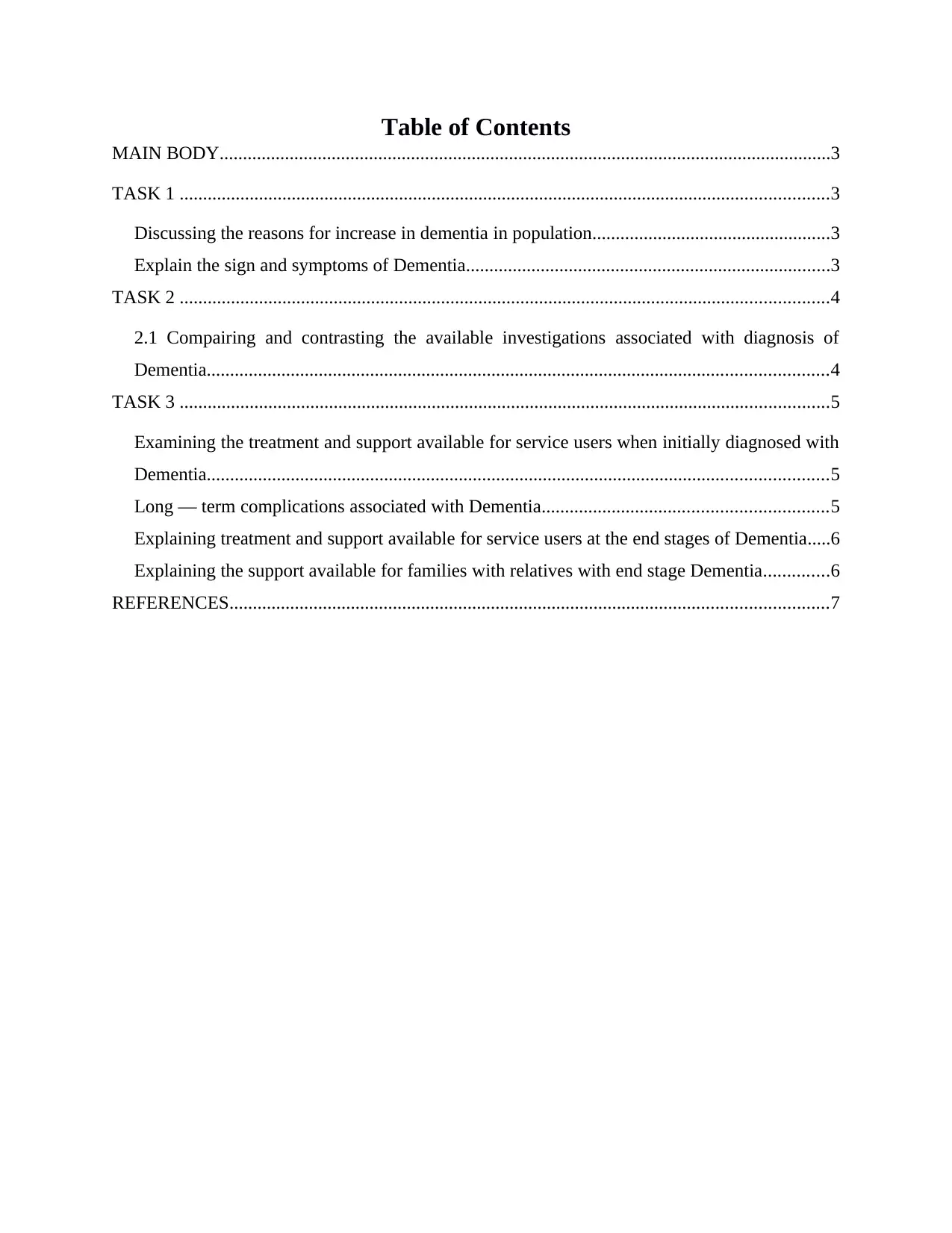
Table of Contents
MAIN BODY...................................................................................................................................3
TASK 1 ...........................................................................................................................................3
Discussing the reasons for increase in dementia in population...................................................3
Explain the sign and symptoms of Dementia..............................................................................3
TASK 2 ...........................................................................................................................................4
2.1 Compairing and contrasting the available investigations associated with diagnosis of
Dementia.....................................................................................................................................4
TASK 3 ...........................................................................................................................................5
Examining the treatment and support available for service users when initially diagnosed with
Dementia.....................................................................................................................................5
Long — term complications associated with Dementia.............................................................5
Explaining treatment and support available for service users at the end stages of Dementia.....6
Explaining the support available for families with relatives with end stage Dementia..............6
REFERENCES................................................................................................................................7
MAIN BODY...................................................................................................................................3
TASK 1 ...........................................................................................................................................3
Discussing the reasons for increase in dementia in population...................................................3
Explain the sign and symptoms of Dementia..............................................................................3
TASK 2 ...........................................................................................................................................4
2.1 Compairing and contrasting the available investigations associated with diagnosis of
Dementia.....................................................................................................................................4
TASK 3 ...........................................................................................................................................5
Examining the treatment and support available for service users when initially diagnosed with
Dementia.....................................................................................................................................5
Long — term complications associated with Dementia.............................................................5
Explaining treatment and support available for service users at the end stages of Dementia.....6
Explaining the support available for families with relatives with end stage Dementia..............6
REFERENCES................................................................................................................................7
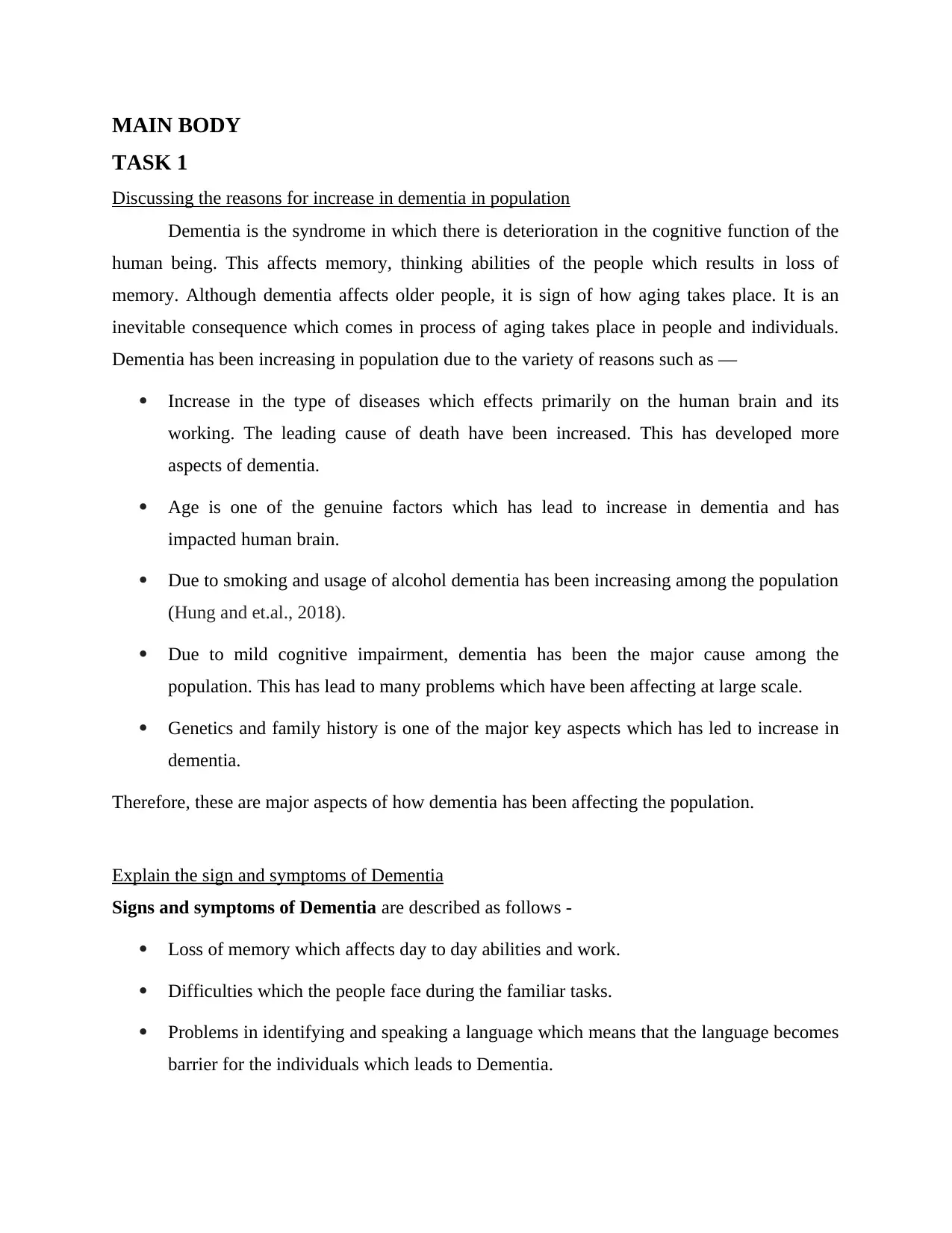
MAIN BODY
TASK 1
Discussing the reasons for increase in dementia in population
Dementia is the syndrome in which there is deterioration in the cognitive function of the
human being. This affects memory, thinking abilities of the people which results in loss of
memory. Although dementia affects older people, it is sign of how aging takes place. It is an
inevitable consequence which comes in process of aging takes place in people and individuals.
Dementia has been increasing in population due to the variety of reasons such as —
Increase in the type of diseases which effects primarily on the human brain and its
working. The leading cause of death have been increased. This has developed more
aspects of dementia.
Age is one of the genuine factors which has lead to increase in dementia and has
impacted human brain.
Due to smoking and usage of alcohol dementia has been increasing among the population
(Hung and et.al., 2018).
Due to mild cognitive impairment, dementia has been the major cause among the
population. This has lead to many problems which have been affecting at large scale.
Genetics and family history is one of the major key aspects which has led to increase in
dementia.
Therefore, these are major aspects of how dementia has been affecting the population.
Explain the sign and symptoms of Dementia
Signs and symptoms of Dementia are described as follows -
Loss of memory which affects day to day abilities and work.
Difficulties which the people face during the familiar tasks.
Problems in identifying and speaking a language which means that the language becomes
barrier for the individuals which leads to Dementia.
TASK 1
Discussing the reasons for increase in dementia in population
Dementia is the syndrome in which there is deterioration in the cognitive function of the
human being. This affects memory, thinking abilities of the people which results in loss of
memory. Although dementia affects older people, it is sign of how aging takes place. It is an
inevitable consequence which comes in process of aging takes place in people and individuals.
Dementia has been increasing in population due to the variety of reasons such as —
Increase in the type of diseases which effects primarily on the human brain and its
working. The leading cause of death have been increased. This has developed more
aspects of dementia.
Age is one of the genuine factors which has lead to increase in dementia and has
impacted human brain.
Due to smoking and usage of alcohol dementia has been increasing among the population
(Hung and et.al., 2018).
Due to mild cognitive impairment, dementia has been the major cause among the
population. This has lead to many problems which have been affecting at large scale.
Genetics and family history is one of the major key aspects which has led to increase in
dementia.
Therefore, these are major aspects of how dementia has been affecting the population.
Explain the sign and symptoms of Dementia
Signs and symptoms of Dementia are described as follows -
Loss of memory which affects day to day abilities and work.
Difficulties which the people face during the familiar tasks.
Problems in identifying and speaking a language which means that the language becomes
barrier for the individuals which leads to Dementia.
⊘ This is a preview!⊘
Do you want full access?
Subscribe today to unlock all pages.

Trusted by 1+ million students worldwide
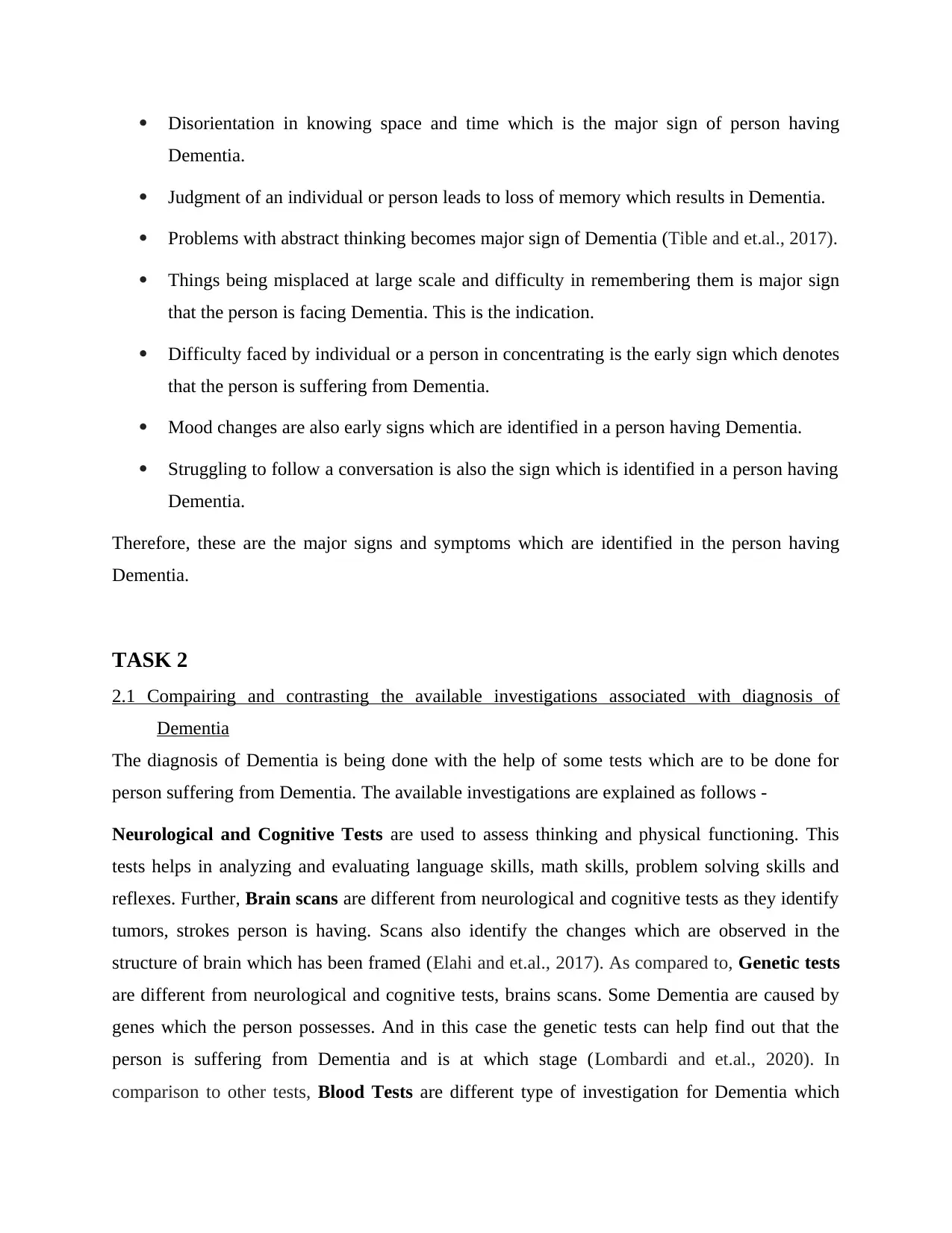
Disorientation in knowing space and time which is the major sign of person having
Dementia.
Judgment of an individual or person leads to loss of memory which results in Dementia.
Problems with abstract thinking becomes major sign of Dementia (Tible and et.al., 2017).
Things being misplaced at large scale and difficulty in remembering them is major sign
that the person is facing Dementia. This is the indication.
Difficulty faced by individual or a person in concentrating is the early sign which denotes
that the person is suffering from Dementia.
Mood changes are also early signs which are identified in a person having Dementia.
Struggling to follow a conversation is also the sign which is identified in a person having
Dementia.
Therefore, these are the major signs and symptoms which are identified in the person having
Dementia.
TASK 2
2.1 Compairing and contrasting the available investigations associated with diagnosis of
Dementia
The diagnosis of Dementia is being done with the help of some tests which are to be done for
person suffering from Dementia. The available investigations are explained as follows -
Neurological and Cognitive Tests are used to assess thinking and physical functioning. This
tests helps in analyzing and evaluating language skills, math skills, problem solving skills and
reflexes. Further, Brain scans are different from neurological and cognitive tests as they identify
tumors, strokes person is having. Scans also identify the changes which are observed in the
structure of brain which has been framed (Elahi and et.al., 2017). As compared to, Genetic tests
are different from neurological and cognitive tests, brains scans. Some Dementia are caused by
genes which the person possesses. And in this case the genetic tests can help find out that the
person is suffering from Dementia and is at which stage (Lombardi and et.al., 2020). In
comparison to other tests, Blood Tests are different type of investigation for Dementia which
Dementia.
Judgment of an individual or person leads to loss of memory which results in Dementia.
Problems with abstract thinking becomes major sign of Dementia (Tible and et.al., 2017).
Things being misplaced at large scale and difficulty in remembering them is major sign
that the person is facing Dementia. This is the indication.
Difficulty faced by individual or a person in concentrating is the early sign which denotes
that the person is suffering from Dementia.
Mood changes are also early signs which are identified in a person having Dementia.
Struggling to follow a conversation is also the sign which is identified in a person having
Dementia.
Therefore, these are the major signs and symptoms which are identified in the person having
Dementia.
TASK 2
2.1 Compairing and contrasting the available investigations associated with diagnosis of
Dementia
The diagnosis of Dementia is being done with the help of some tests which are to be done for
person suffering from Dementia. The available investigations are explained as follows -
Neurological and Cognitive Tests are used to assess thinking and physical functioning. This
tests helps in analyzing and evaluating language skills, math skills, problem solving skills and
reflexes. Further, Brain scans are different from neurological and cognitive tests as they identify
tumors, strokes person is having. Scans also identify the changes which are observed in the
structure of brain which has been framed (Elahi and et.al., 2017). As compared to, Genetic tests
are different from neurological and cognitive tests, brains scans. Some Dementia are caused by
genes which the person possesses. And in this case the genetic tests can help find out that the
person is suffering from Dementia and is at which stage (Lombardi and et.al., 2020). In
comparison to other tests, Blood Tests are different type of investigation for Dementia which
Paraphrase This Document
Need a fresh take? Get an instant paraphrase of this document with our AI Paraphraser
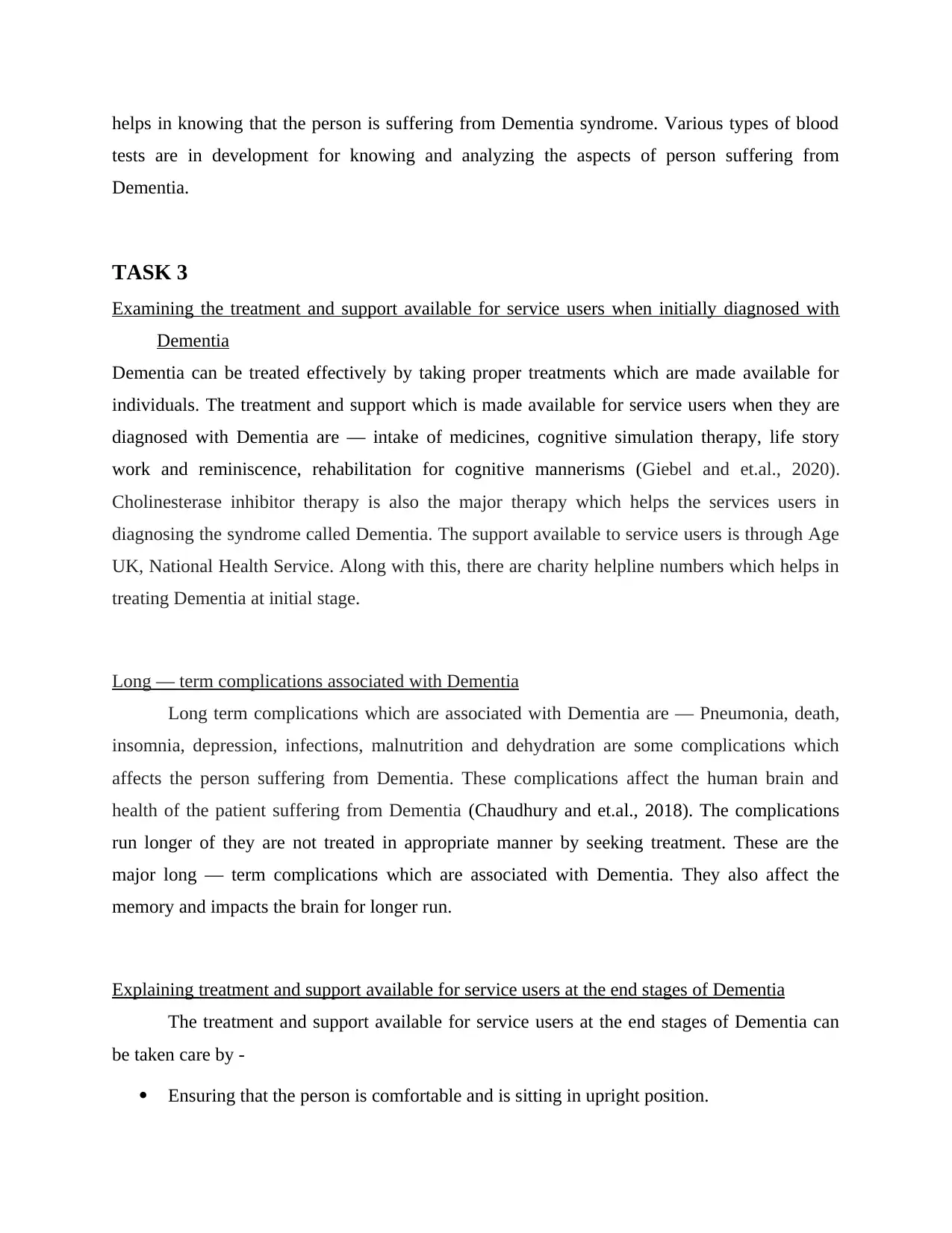
helps in knowing that the person is suffering from Dementia syndrome. Various types of blood
tests are in development for knowing and analyzing the aspects of person suffering from
Dementia.
TASK 3
Examining the treatment and support available for service users when initially diagnosed with
Dementia
Dementia can be treated effectively by taking proper treatments which are made available for
individuals. The treatment and support which is made available for service users when they are
diagnosed with Dementia are — intake of medicines, cognitive simulation therapy, life story
work and reminiscence, rehabilitation for cognitive mannerisms (Giebel and et.al., 2020).
Cholinesterase inhibitor therapy is also the major therapy which helps the services users in
diagnosing the syndrome called Dementia. The support available to service users is through Age
UK, National Health Service. Along with this, there are charity helpline numbers which helps in
treating Dementia at initial stage.
Long — term complications associated with Dementia
Long term complications which are associated with Dementia are — Pneumonia, death,
insomnia, depression, infections, malnutrition and dehydration are some complications which
affects the person suffering from Dementia. These complications affect the human brain and
health of the patient suffering from Dementia (Chaudhury and et.al., 2018). The complications
run longer of they are not treated in appropriate manner by seeking treatment. These are the
major long — term complications which are associated with Dementia. They also affect the
memory and impacts the brain for longer run.
Explaining treatment and support available for service users at the end stages of Dementia
The treatment and support available for service users at the end stages of Dementia can
be taken care by -
Ensuring that the person is comfortable and is sitting in upright position.
tests are in development for knowing and analyzing the aspects of person suffering from
Dementia.
TASK 3
Examining the treatment and support available for service users when initially diagnosed with
Dementia
Dementia can be treated effectively by taking proper treatments which are made available for
individuals. The treatment and support which is made available for service users when they are
diagnosed with Dementia are — intake of medicines, cognitive simulation therapy, life story
work and reminiscence, rehabilitation for cognitive mannerisms (Giebel and et.al., 2020).
Cholinesterase inhibitor therapy is also the major therapy which helps the services users in
diagnosing the syndrome called Dementia. The support available to service users is through Age
UK, National Health Service. Along with this, there are charity helpline numbers which helps in
treating Dementia at initial stage.
Long — term complications associated with Dementia
Long term complications which are associated with Dementia are — Pneumonia, death,
insomnia, depression, infections, malnutrition and dehydration are some complications which
affects the person suffering from Dementia. These complications affect the human brain and
health of the patient suffering from Dementia (Chaudhury and et.al., 2018). The complications
run longer of they are not treated in appropriate manner by seeking treatment. These are the
major long — term complications which are associated with Dementia. They also affect the
memory and impacts the brain for longer run.
Explaining treatment and support available for service users at the end stages of Dementia
The treatment and support available for service users at the end stages of Dementia can
be taken care by -
Ensuring that the person is comfortable and is sitting in upright position.
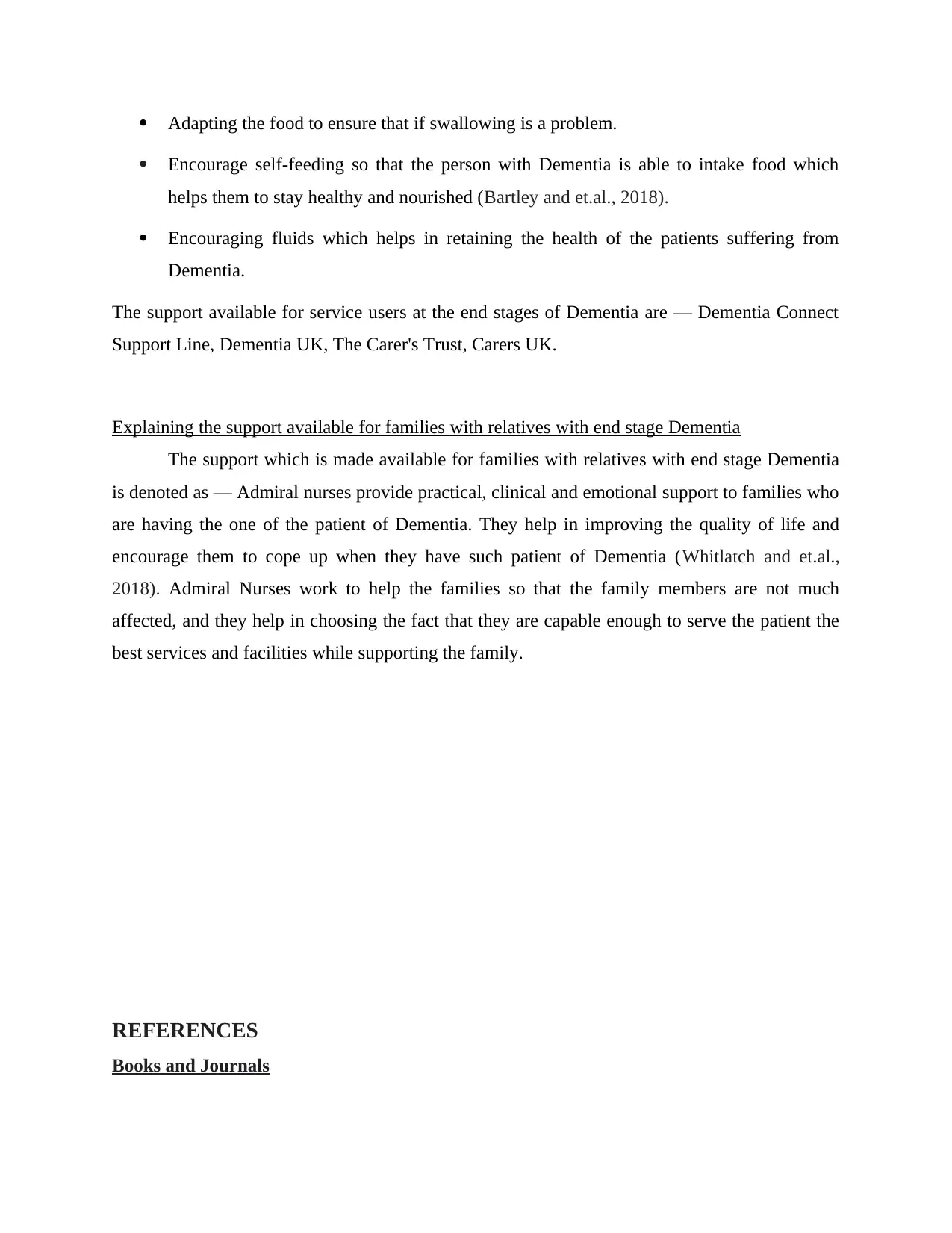
Adapting the food to ensure that if swallowing is a problem.
Encourage self-feeding so that the person with Dementia is able to intake food which
helps them to stay healthy and nourished (Bartley and et.al., 2018).
Encouraging fluids which helps in retaining the health of the patients suffering from
Dementia.
The support available for service users at the end stages of Dementia are — Dementia Connect
Support Line, Dementia UK, The Carer's Trust, Carers UK.
Explaining the support available for families with relatives with end stage Dementia
The support which is made available for families with relatives with end stage Dementia
is denoted as — Admiral nurses provide practical, clinical and emotional support to families who
are having the one of the patient of Dementia. They help in improving the quality of life and
encourage them to cope up when they have such patient of Dementia (Whitlatch and et.al.,
2018). Admiral Nurses work to help the families so that the family members are not much
affected, and they help in choosing the fact that they are capable enough to serve the patient the
best services and facilities while supporting the family.
REFERENCES
Books and Journals
Encourage self-feeding so that the person with Dementia is able to intake food which
helps them to stay healthy and nourished (Bartley and et.al., 2018).
Encouraging fluids which helps in retaining the health of the patients suffering from
Dementia.
The support available for service users at the end stages of Dementia are — Dementia Connect
Support Line, Dementia UK, The Carer's Trust, Carers UK.
Explaining the support available for families with relatives with end stage Dementia
The support which is made available for families with relatives with end stage Dementia
is denoted as — Admiral nurses provide practical, clinical and emotional support to families who
are having the one of the patient of Dementia. They help in improving the quality of life and
encourage them to cope up when they have such patient of Dementia (Whitlatch and et.al.,
2018). Admiral Nurses work to help the families so that the family members are not much
affected, and they help in choosing the fact that they are capable enough to serve the patient the
best services and facilities while supporting the family.
REFERENCES
Books and Journals
⊘ This is a preview!⊘
Do you want full access?
Subscribe today to unlock all pages.

Trusted by 1+ million students worldwide
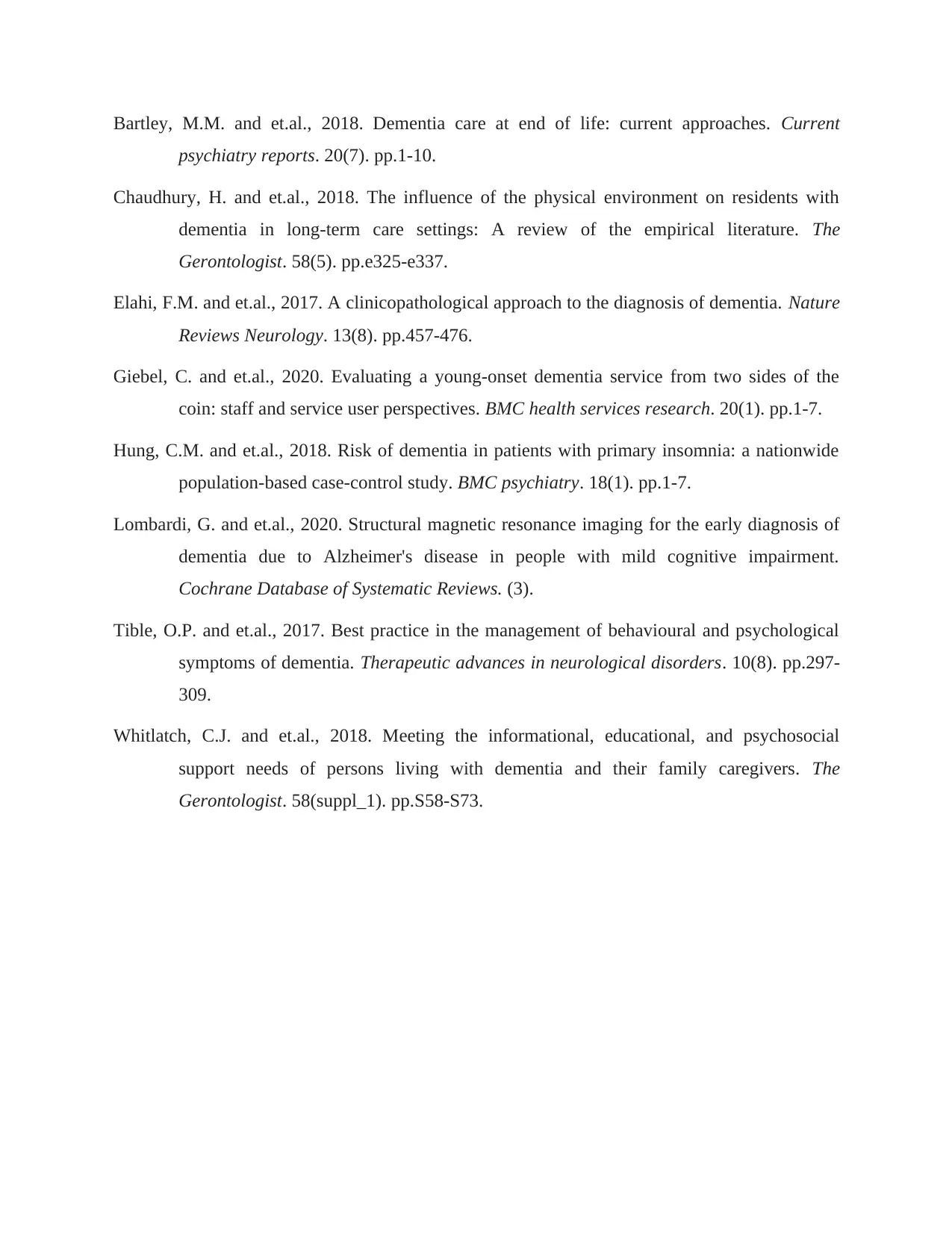
Bartley, M.M. and et.al., 2018. Dementia care at end of life: current approaches. Current
psychiatry reports. 20(7). pp.1-10.
Chaudhury, H. and et.al., 2018. The influence of the physical environment on residents with
dementia in long-term care settings: A review of the empirical literature. The
Gerontologist. 58(5). pp.e325-e337.
Elahi, F.M. and et.al., 2017. A clinicopathological approach to the diagnosis of dementia. Nature
Reviews Neurology. 13(8). pp.457-476.
Giebel, C. and et.al., 2020. Evaluating a young-onset dementia service from two sides of the
coin: staff and service user perspectives. BMC health services research. 20(1). pp.1-7.
Hung, C.M. and et.al., 2018. Risk of dementia in patients with primary insomnia: a nationwide
population-based case-control study. BMC psychiatry. 18(1). pp.1-7.
Lombardi, G. and et.al., 2020. Structural magnetic resonance imaging for the early diagnosis of
dementia due to Alzheimer's disease in people with mild cognitive impairment.
Cochrane Database of Systematic Reviews. (3).
Tible, O.P. and et.al., 2017. Best practice in the management of behavioural and psychological
symptoms of dementia. Therapeutic advances in neurological disorders. 10(8). pp.297-
309.
Whitlatch, C.J. and et.al., 2018. Meeting the informational, educational, and psychosocial
support needs of persons living with dementia and their family caregivers. The
Gerontologist. 58(suppl_1). pp.S58-S73.
psychiatry reports. 20(7). pp.1-10.
Chaudhury, H. and et.al., 2018. The influence of the physical environment on residents with
dementia in long-term care settings: A review of the empirical literature. The
Gerontologist. 58(5). pp.e325-e337.
Elahi, F.M. and et.al., 2017. A clinicopathological approach to the diagnosis of dementia. Nature
Reviews Neurology. 13(8). pp.457-476.
Giebel, C. and et.al., 2020. Evaluating a young-onset dementia service from two sides of the
coin: staff and service user perspectives. BMC health services research. 20(1). pp.1-7.
Hung, C.M. and et.al., 2018. Risk of dementia in patients with primary insomnia: a nationwide
population-based case-control study. BMC psychiatry. 18(1). pp.1-7.
Lombardi, G. and et.al., 2020. Structural magnetic resonance imaging for the early diagnosis of
dementia due to Alzheimer's disease in people with mild cognitive impairment.
Cochrane Database of Systematic Reviews. (3).
Tible, O.P. and et.al., 2017. Best practice in the management of behavioural and psychological
symptoms of dementia. Therapeutic advances in neurological disorders. 10(8). pp.297-
309.
Whitlatch, C.J. and et.al., 2018. Meeting the informational, educational, and psychosocial
support needs of persons living with dementia and their family caregivers. The
Gerontologist. 58(suppl_1). pp.S58-S73.
1 out of 7
Related Documents
Your All-in-One AI-Powered Toolkit for Academic Success.
+13062052269
info@desklib.com
Available 24*7 on WhatsApp / Email
![[object Object]](/_next/static/media/star-bottom.7253800d.svg)
Unlock your academic potential
Copyright © 2020–2026 A2Z Services. All Rights Reserved. Developed and managed by ZUCOL.





